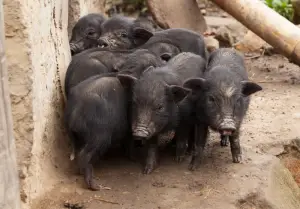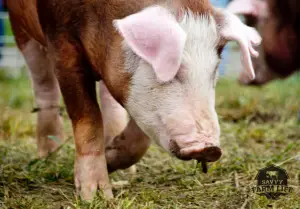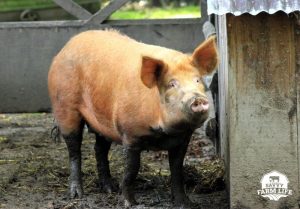Best Pig Breeds To Own As Pets
Pigs have gained popularity as pets in recent years – due in part to the abundance of online videos and photos of so-called “micro pigs.” While the claims of their miniature size are at times dubious, the fact remains that pigs can make excellent pets – with their affectionate personalities and high level of intelligence.
What are the best pig breeds to own as pets? Not all pig breeds will do well as companion animals. Ten of the best pig breeds to keep as pets include the following:
- Vietnamese Potbellied
- Kunekune
- Juliana
- Hereford
- Meishan
- Tamworth
- African Pygmy
- Mulefoot
- Ossabaw
- Yucatan
Read on to learn more about what makes each of these breeds a great choice to keep as a pet.
Top Pet Pig Breeds
Vietnamese Potbellied 
Vietnamese Potbellied (or simply, Potbellied) pigs have been popular as pets in the US since the 1980’s, and are most commonly bred specifically as companion animals. Most breeders advertising “mini pigs” are actually selling Vietnamese Potbellied piglets.
Potbellied pigs are aptly named for their especially round bodies – with bellies almost reaching to the ground. These pigs, while not considered “teacup”, are quite small when compared to other swine, and only reach a mature weight of between 120 and 200 pounds (which is still quite large when you consider the weight of other animals considered “pets”). Potbellied pigs are friendly, affectionate, and like other breeds of swine, incredibly intelligent.
Kunekune
The Kunekune (literally translated as “fat and round” in Maori) is known as the friendliest of pig breeds. Kunekunes are another small breed, maturing at only 150-250 pounds, and are hairier than other pigs. They come in a variety of coat colors, including spotted, ginger, tri-colored, and cream. While Kunekunes are commonly raised for their meat, they are an excellent breed of choice to keep as a pet.
Juliana
Juliana pigs are as “mini” as they come, with adults maturing to a weight of 40-80 pounds and reaching only 15-17” in height. These pigs come in a wide range of colorful patterns and have a thick coat of hair. A Juliana with no spots is unable to be added to the registry.
Because Julianas have been bred primarily as companion animals, they are generally sweet and friendly. While there are many breeders who claim to sell Julianas, in reality, there are very few purebred Julianas in the world, and many sold under this name are mixed breeds.
Hereford 
Herefords are a true heavy-weight farm breed, maturing to between 600 and 800 pounds. While you may not want to raise this breed in your home for logistical reasons, they make excellent pasture pets. Herefords have a unique color pattern similar to that of Hereford cattle – they have red bodies with white heads, legs, and bellies.
They are also especially docile and peaceful animals, happily kept as companion animals. Because of their desirable appearances and temperaments, Herefords are especially popular in 4H and FFA clubs.
Meishan
If you like the look of rolly, wrinkly pigs, you will fall in love with the Meishan. Meishans are small-medium and reach a maximum of 275-400 pounds when fully grown. While their looks give them a distinguishable edge, their personalities are where they really shine – Meishans are especially gentle and quiet and are known as a great breed for anyone who might be timid around swine.
Tamworth 
Tamworth pigs are a medium-sized breed, averaging 500-600 pounds at maturity. They are distinguished by their solid reddish-brown coloring and lean build. Tamworths are a great choice if you would like to let your pig lead a more natural life – they excel as foragers and do particularly well in forested areas. Tamworth pigs are hardy and easy to care for.
African Pygmy
The African Pygmy, though not as popular and readily available as some other breeds, is a good choice of pet with their smaller stature and the close relationship they can develop with their human(s). African Pygmies can weigh anywhere from 60 to 200 pounds at maturity, depending on their parentage.
Mulefoot
The Mulefoot is so named for its non-cloven feet, similar to the hooves of a mule. Mulefoot hogs are another medium-sized breed, with a mature weight between 400 and 600 pounds. Mulefoot hogs are known to be gentle and docile, making them an excellent choice as a companion animal.
They are, unfortunately, quite rare – with a mere 200 purebred hogs estimated to be in the United States. While not as common as many other breeds, they are worth mentioning for their especially peaceful dispositions, and should their conservation efforts be successful, they are worth looking into as pets.
Ossabaw
Ossabaw Island Hogs, or simply Ossabaws, are close to their feral relatives in both behavior and appearance. For years they were isolated on Ossabaw Island, where food was seasonal and at times scarce. They have therefore developed the ability to store fat and gain weight on less food than many other breeds.
Ossabaws are considered small pigs, weighing only around 200 pounds at maturity. They have thicker hair than most domestic pigs, long snouts, and erect ears. Ossabaws may exhibit behaviors closer to feral pigs, but they are friendly and outgoing enough to be considered good companion animals.
Yucatan
The Yucatan, also known as the Mexican Hairless Pig, is better acclimated to tropical climates than many other pig breeds due to the fact that they are virtually hairless. Yucatans are lean pigs, slate gray in color, with only sparse (or no) hair on their bodies. Yucatans are small pigs, reaching an average of only 180 pounds when fully grown.
Yucatan pigs are very friendly and docile. They are a good choice to keep as a pet because of their easy-going temperaments. Yucatans are also quite active compared to many pigs – this can be a positive in that they are fun to watch and interact with, and also a negative in that they are more likely to get into things they shouldn’t.
Why Keep A Pig As A Pet?
Years ago, the idea of keeping a pig as a pet would have been met with laughter. Pigs have long been raised as a sustainable source of meat – producing just as well in a large-scale operation as on a small homestead. There are several reasons they have gained popularity as companion animals, however.
Most pigs are friendly animals, and though they are technically prey animals, they are not as flighty as their more skittish farm animal friends. Pigs genuinely enjoy companionship and are not shy with their affection. Pigs are also incredibly smart, rivaled in intelligence only by the dolphin, elephant, and some species of ape (some would add the crow to that list). If not for their admittedly stubborn natures, pigs would be more trainable than even dogs.
As the trend of keeping pigs as pets has grown, so have the advertisements for “micro” or “teacup” pigs. Many of these pigs are sold by less-than-honest breeders, and the pigs promised to weigh no more than 20 pounds quickly reach a mature weight of up to 500 pounds (or more). Nevertheless, if you accept the fact that there is no true “purse pig”, there are many breeds that will make wonderful pets. Just make sure to read on to learn the true characteristics (and sizes) of the below breeds.
Can Pet Pigs Live Indoors?
You may be wondering if pigs are well-adapted to living indoors. While many people keep their pet pigs in their homes with them, you will want to be thorough in researching whether this would be the right set-up for you.
Pigs are notoriously easy to house train and can be quite lazy – both attributes that would serve them well in the home. On the other hand, even the smallest pig breeds are quite large when compared to other indoor pets, and they can get into things they shouldn’t and become destructive.
You may also assume that because pigs are so smart, they are similar in behavior to pet dogs. In reality, pigs are very different from dogs, and comparing the two would be like comparing apples to oranges. While pigs are highly intelligent (smarter, in fact, than dogs), they are also quite stubborn and are not as eager to please as your typical Golden Retriever.
Will Your Next Pet Be A Pig?
While pet pigs are not for everyone, many pig owners love their porcine pals just as they love their dogs. Pigs are easy to house-train, affectionate with their human families, and hypoallergenic (especially if you are thinking about the Yucatan).
While there are unique challenges to owning a pig as a pet – particularly if you are hoping to keep your pig in your home – pet pigs can also be incredibly rewarding. If, after doing your research, you determine that a pig is the right pet for you, you are likely to find your new best friend within one of the breeds above.
